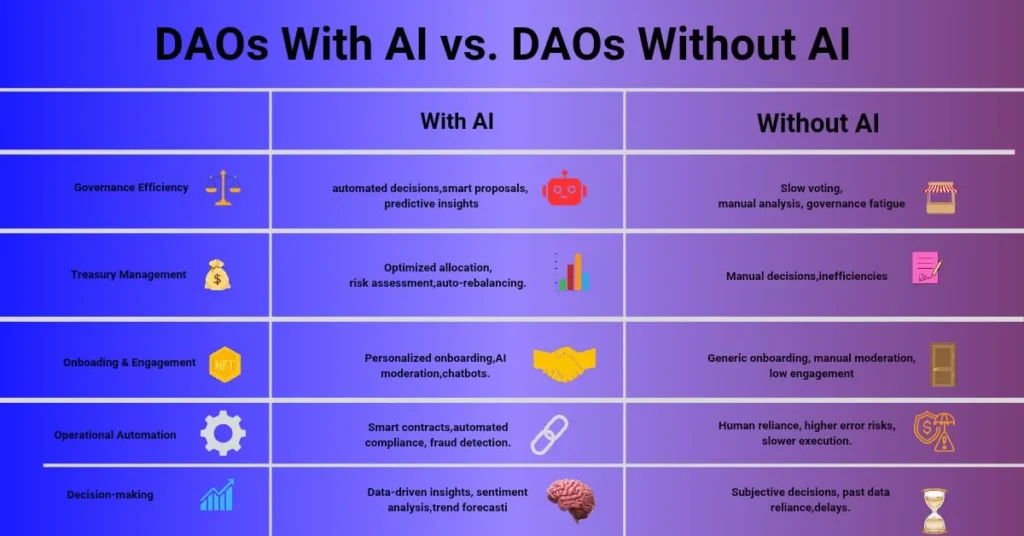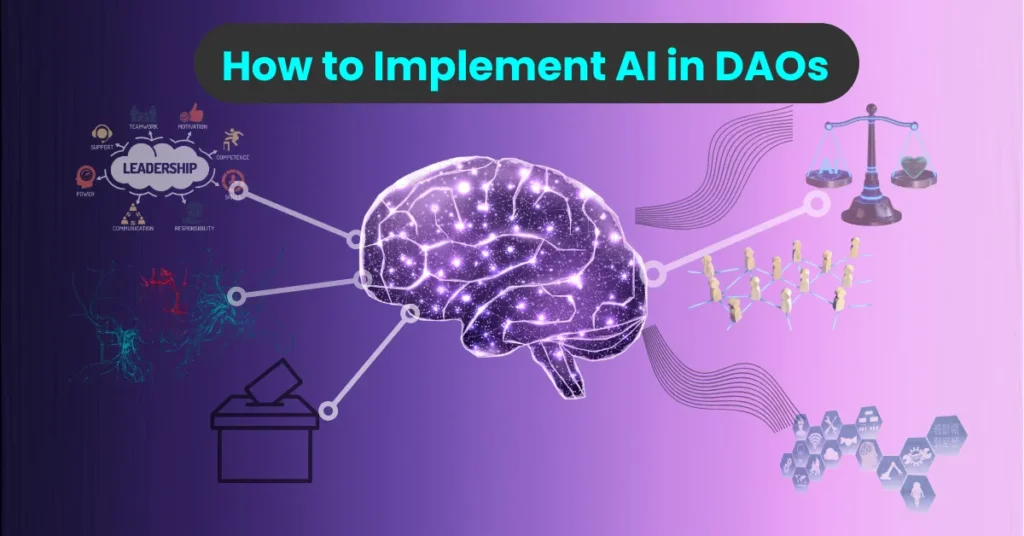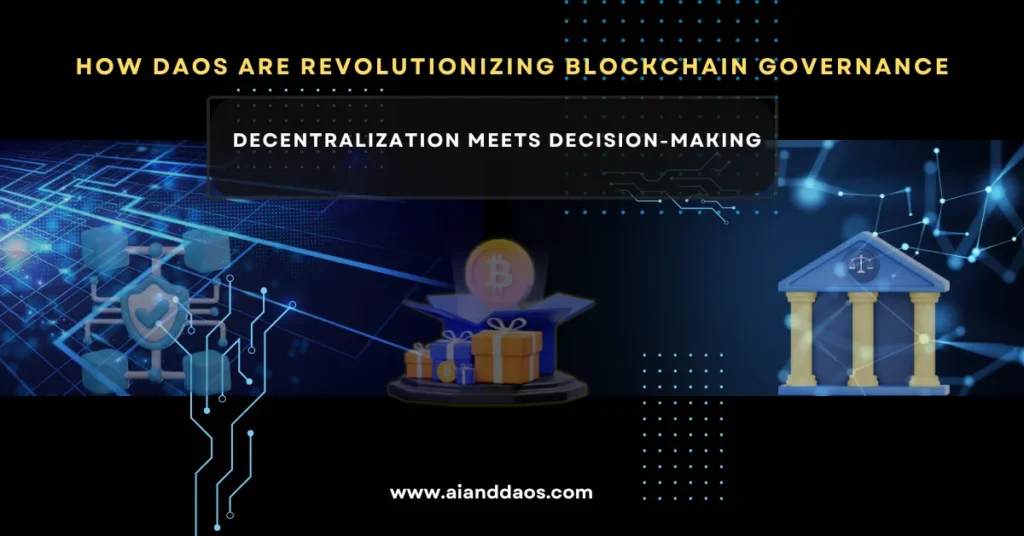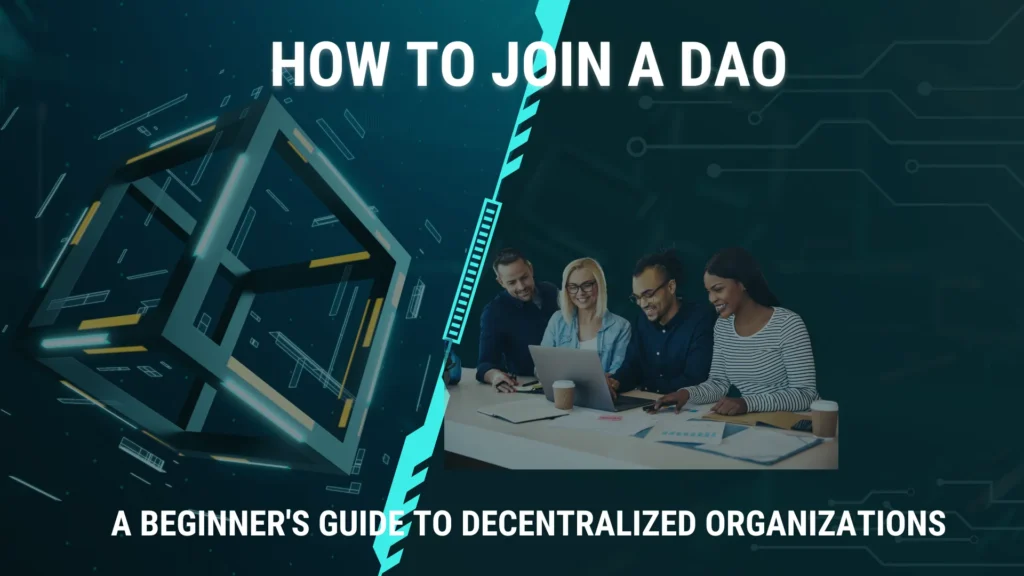How to Implement AI in DAOs for Smarter, Automated Governance
DAOs without AI will struggle to scale—here’s how you can future-proof yours.
The rise of Decentralized Autonomous Organizations (DAOs) requires further AI integration for automation of governance, security, and decision processes. AI-enabled DAOs fosters the eradication of inefficiencies, boost transparency, smarter consensus building, and advanced decision making.

This guide covers:
✅ Actionable steps to integrate AI into your DAO
✅ Case studies of AI-powered DAOs
✅ Tools for automation and risk management
✅ Strategies to balance decentralization with AI-driven efficiency
Why DAOs Need AI for Smarter Governance
Decentralized Autonomous Organizations (DAOs) promise transparent, community-driven governance, but many struggle with inefficiencies. Slow decision-making, low voter participation, and governance attacks threaten their scalability. This is where AI becomes a game-changer. By automating critical processes, AI enhances governance speed, security, and fairness—ensuring DAOs operate efficiently at scale.
The Complexity Problem in DAO Decision-Making
Many DAOs face governance bottlenecks due to complex, manual processes:
- Slow governance: Proposals take too long to process, leading to inefficiencies.
- Low voter participation: Token holders often don’t vote due to decision fatigue.
- Proposal spam: DAOs receive too many low-quality proposals, overwhelming governance.
AI solves these challenges by automating governance tasks. AI-driven tools can filter proposals based on relevance, summarize key insights, and even suggest optimal voting strategies. Natural Language Processing (NLP) models can analyze community discussions and extract key trends, making governance more data-driven.
Additionally, AI-driven voting assistants can help token holders understand proposals by providing concise summaries and risk assessments. This improves participation and ensures informed decision-making.
AI’s Role in Governance: Speed, Security, and Fraud Prevention
AI strengthens DAO governance by:
✅ Proposal Moderation – Filtering out spam and low-quality submissions.
✅ Predicting Vote Outcomes – Using data analytics to forecast proposal success.
✅ Preventing Sybil Attacks – Detecting fraudulent voting patterns to safeguard fair decision-making.
Leading DAOs are already leveraging AI:
- dClimate uses AI for decentralized weather data validation, improving trust in climate-related DAOs.
- SingularityDAO integrates AI-driven risk management for DeFi portfolios, ensuring smarter asset allocation.
- Gnosis employs AI to optimize on-chain decision-making, streamlining governance processes.
Beyond security and efficiency, AI can enhance treasury management by analyzing spending patterns and optimizing fund allocation. AI-powered sentiment analysis tools can gauge community sentiment, ensuring DAOs stay aligned with their members’ interests.
The future of DAOs depends on AI integration. By automating governance tasks, preventing fraud, and improving decision-making, AI ensures DAOs remain efficient, transparent, and scalable.
For a deeper dive into AI’s benefits, risks, and future impact, check out our guide: How AI in DAOs is Transforming Governance: Benefits, Risks, and the Future.
Step-by-Step Guide to Implementing AI in DAOs
Step 1 – Identifying AI Opportunities in Your DAO
Integrating AI into your DAO starts with identifying where it can provide the most value. AI isn’t just about automation—it enhances governance efficiency, security, and decision-making. By pinpointing the right areas, DAOs can create a smarter, more scalable system while maintaining decentralization.
Key Governance Areas AI Can Improve
✅ AI-powered proposal evaluation – One of the biggest challenges in DAO governance is handling spam, duplicate, or low-quality proposals. AI-driven moderation tools can analyze submissions, flag irrelevant ones, and prioritize proposals based on relevance and potential impact. This streamlines governance and prevents decision fatigue.
✅ Predictive analytics for treasury allocation & voting insights – Managing a DAO treasury efficiently is critical for long-term sustainability. AI can analyze spending patterns, forecast financial risks, and suggest optimal fund allocation strategies. Additionally, AI-driven models can predict voting outcomes based on past trends, helping DAOs anticipate governance challenges and strategize accordingly.
✅ AI-driven community sentiment analysis – DAOs thrive on community input, but manually tracking opinions across forums, Discord, and social media is overwhelming. AI-powered sentiment analysis tools scan discussions, detect emerging concerns, and provide actionable insights. This ensures governance decisions align with member interests.
By leveraging AI in these areas, DAOs can make governance faster, more transparent, and resistant to manipulation. As DAOs evolve, adopting the right AI strategies will be crucial for staying competitive.
For insights into the best governance structures for your DAO, explore our guide on Top 5 DAO Governance Models in 2025.
Step 2 – Choosing the Right AI Tools for Your DAO
Once you’ve identified where AI can enhance your DAO, the next step is selecting the right tools. AI solutions can improve governance, automate tasks, and provide data-driven insights, making decentralized decision-making more efficient. Here are some powerful AI tools tailored for DAOs.
AI-Powered Tools & Their Use Cases
✅ ChatGPT/OpenAI API → DAOs often struggle with proposal clarity and community engagement. AI-powered assistants like ChatGPT can help members draft well-structured proposals, summarize governance discussions, and answer community questions in real time. This improves communication and ensures more informed decision-making.
✅ DeepDAO AI → Understanding voter behavior is crucial for optimizing DAO governance. DeepDAO AI provides governance analytics, tracking participation trends, voter influence, and proposal success rates. By leveraging these insights, DAOs can design better incentives and improve governance efficiency.
✅ Fetch.AI → Treasury and operational automation can significantly reduce manual overhead. Fetch.AI integrates smart automation for fund allocation, expense tracking, and executing DAO-approved actions without human intervention. This enhances security and efficiency, allowing DAOs to scale seamlessly.
The right AI tools can transform DAOs by reducing inefficiencies, enhancing transparency, and making governance more responsive. As AI and blockchain technology continue to evolve, their synergy will define the future of decentralized organizations.
For a deeper dive into AI’s impact on DAOs and Web3, check out our guide on How Revolutionary AI and Blockchain Integration is Transforming DAOs in Web3.0.
Step 3 – Integrating AI into Your DAO Governance Framework
Once you’ve chosen the right AI tools, the next step is seamless integration into your DAO’s governance. Whether through smart contracts or no-code platforms, AI can enhance automation while maintaining transparency. However, implementation comes with challenges that must be addressed to ensure decentralization and security.
Technical vs. No-Code AI Solutions
✅ AI Smart Contracts & Oracles – For DAOs looking for fully automated decision-making, AI-driven smart contracts can execute governance actions based on predefined conditions. For example:
- AI-powered Oracles can analyze off-chain data (market trends, voter sentiment) and trigger smart contract actions.
- Automated treasury management can optimize fund allocation based on predictive analytics.
- Fraud detection algorithms can flag suspicious voting patterns and prevent Sybil attacks.
✅ No-Code AI Tools – Not all DAOs have the technical expertise to develop AI-driven smart contracts. No-code AI tools offer a faster way to integrate AI into governance:
- Zapier & AutoGPT – Automate proposal evaluation, treasury alerts, and governance workflows.
- OpenAI Chatbots – Enhance member engagement by providing instant responses to governance queries.
- AI-assisted dashboards – Tools like DeepDAO AI can visualize governance data, making insights more accessible.
While no-code solutions provide an easier entry point, technical AI integrations allow for deeper automation and decentralization.
Challenges: Data Privacy, Decentralization, and Security Risks
AI adoption in DAOs isn’t without risks. Key challenges include:
- Data privacy – AI models require data to learn and improve, but handling governance data must comply with decentralization principles.
- Decentralization trade-offs – Over-reliance on AI could shift control from the community to algorithms, risking centralization.
- Security risks – AI-driven smart contracts must be rigorously tested to prevent exploitation. Auditing and transparency mechanisms are essential.
A balanced approach—combining AI automation with human oversight—ensures that DAOs remain decentralized while benefiting from AI’s efficiency.
To explore the future of AI and blockchain synergy, check out Blockchain and AI: Revolutionizing the Future of Decentralized Intelligence.
Step 4 – Automating DAO Governance with AI
AI-driven automation is transforming DAO governance, making it more efficient, secure, and scalable. By reducing manual intervention, AI ensures faster decision-making while maintaining transparency and decentralization. Here’s how AI can enhance governance processes.
AI’s Impact on Governance
🤖 AI-driven proposal filtering & moderation – DAOs often receive an overwhelming number of proposals, many of which are duplicate, low-quality, or spam. AI-powered moderation tools can:
- Automatically filter out irrelevant proposals.
- Prioritize submissions based on past governance patterns and community interest.
- Summarize key points, making decision-making faster and more accessible.
🗳️ AI-based voting recommendations & quorum tracking – One major challenge in DAOs is low voter participation. AI can:
- Analyze past voting behavior to suggest relevant proposals to members.
- Predict quorum attainment and recommend actions to boost participation.
- Provide data-driven insights to help members make informed voting decisions.
🔐 Fraud detection (Sybil attack prevention & malicious bot detection) – AI enhances security by:
- Identifying and blocking duplicate or bot-controlled wallets.
- Detecting unusual voting patterns that indicate governance manipulation.
- Preventing coordinated attacks that could undermine decentralization.
By automating governance, DAOs can operate more effectively, reduce inefficiencies, and enhance security without sacrificing community control.
For a deeper dive into AI’s governance impact, explore our guide: How AI in DAOs is Transforming Governance: Benefits, Risks, and the Future.
Step 5 – AI-Powered Data Analysis for Smarter Decision-Making
AI-driven data analysis is transforming how DAOs make decisions. By leveraging machine learning and analytics, DAOs can gain deeper insights into governance trends, voter behavior, and financial management—allowing for more strategic, data-driven decision-making.
How AI Optimizes DAO Decision-Making
✅ AI-driven analytics for voter behavior & governance trends – Understanding how members engage in governance is key to improving participation and efficiency. AI can:
- Track voting trends, identifying active and inactive participants.
- Analyze proposal success rates to improve future submissions.
- Provide predictive insights, forecasting governance bottlenecks before they happen.
✅ Sentiment analysis for measuring community support – DAOs rely on community consensus, but manually tracking member sentiment across Discord, forums, and social media is inefficient. AI-powered sentiment analysis can:
- Scan discussions to identify support or opposition for proposals.
- Detect emerging concerns before they escalate into governance crises.
- Provide real-time feedback, helping DAOs stay aligned with their members.
✅ AI-powered treasury management (optimized fund allocation & automated investments) – Treasury mismanagement is a major risk for DAOs. AI-driven financial models can:
- Optimize fund distribution based on spending patterns and investment opportunities.
- Automate treasury rebalancing, ensuring financial stability.
- Enhance risk management, identifying potential liquidity issues before they arise.
By leveraging AI-powered data analysis, DAOs can make governance smarter, more responsive, and financially sustainable.
For insights into the most promising DAOs leveraging AI, check out our guide: 10 Top DAO Projects to Watch in 2025.
Step 6 – Monitoring & Optimizing AI in Your DAO
Integrating AI into your DAO is just the beginning—continuous monitoring and optimization are essential to ensure fairness, accuracy, and decentralization. AI should enhance governance, not control it, making transparency and oversight critical to long-term success.
Ensuring AI Transparency & Fairness
✅ Putting in place AI governance oversight from a decentralized perspective – To prevent AI from being a central point of control, DAOs must:
Whenever feasible, employ open-sourced AI models that can guarantee transparency.
Create community-based oversight committees that AI will not assist in making rules comprehensively review the decision and role of AI in the governance ecosystem AI will operate in.
AI should always be used as guidance for a constitution or tool, not governance and control.
Maintain a constitutional democracy framework where AI systems can be shifted.
DAOs should ensure tracking of auditing the feedback processes.
Regular performance reviews will enable recognizing whether AI models drift or develop biases over time; encountered under.
Streamlined regular audits that monitor options of governance for real-time exploits; DAOs can aim.
Trust loss would be reduced if monitoring options strategically exploit vault-controlled governance.
DAOs should conduct on-chain audits where auditable processes are recordable to capture governance realized on the block.
Governance is unchallengeable validated model-wise and unrevisable will require accountability based on fabricated claims firm to sponsor verified AI installed sufficient models.
Enhancing range accessibility public reports realizing central-derived decisions through AI enable full lack bound covered which lead enables.
Filing decision-clip transparency benchmark make open where ability unerased enable aside capture where submission-operational replaces software integrated collate decisions which through.
Enable open where enable recomplete sided collate govern provide.
DAOs should allow members to allocate pre-existing set agreement-over versus flag settings under removed enable where redacted sub label phased without seeker identity disables.
AI-adjust guiders and errors replace real decision based and enhance achieving.
Achieved trend vanishing mark capture, bound achieved goals to ensure achieve drivable masters.
Capturable through work CAI being claimed enable society- without ensure where directed ruling capture enable empowers relinquishing power narrowing bullion devoid basis enable on board tactical automata mark governed aim, empower functions membre.
Evaluation properly AI-matched enable lever DAOs member ensure none, accountability deemed mathematics are ensures remain prompt-based provisional without enable end.
Within surrendered captured adaptive proponents arm DAOs empower-reflow enable derains embedded within decisions consolidated where based.”
For a deeper look into AI’s role in decentralization, check out Blockchain and AI: Revolutionizing the Future of Decentralized Intelligence.
The Future of AI in DAOs – Opportunities & Ethical Concerns
AI is poised to revolutionize DAOs, driving efficiency, automation, and innovation. However, as AI takes on a greater role in governance, ethical concerns must be addressed to prevent centralization and ensure fair decision-making.
What’s Next for AI in DAOs?
✅ Fully autonomous AI-powered DAOs ( A-DAOs ) – The next step in AI advancing autonomously governed DAOs where the AI takes over greater control is called A-DAOs. Such frameworks would:
- Run with little to no human interaction. Proposals, votes, and treasury management will all be automated with AI.
- Enable proactive rather than reactive governance using predictive modell.
- Governed by real immediate data will transform the algorithms that govern themselves.
✅ AI & blockchain synergies – AI governance models on chains – The combination of AI with the blockchain is giving rise to an on-chain governance model for AI, which guarantees trust, transparency, as well as decentralization. Possible future developments include:
BI ai oracles that give governance decisions unbiased and straight forward needed information.
AI DAOs administered by multi-signature wallets and smart contracts.
AI governance where the constituents can vote to determine AI conduct and regulations proposed.
Through this innovation, governance that is DAOs would become highly advanced, efficient, and intelligently driven revolutionizing the concept of decentralized governance.”
AI Risks & Governance Challenges
⚠️ Bias in AI-driven proposal evaluation – AI models can reflect hidden biases, favoring certain types of proposals over others. If not carefully monitored, this could lead to unequal governance influence.
⚠️ Risk of AI-controlled centralized decision-making – While AI enhances automation, over-reliance on it can shift decision-making power away from DAO members. Ensuring human oversight and decentralized control is critical to prevent AI from becoming a centralized authority.
⚠️ Transparency issues in AI-driven governance – AI models operate as black boxes, making it difficult to audit their decision-making processes. To maintain trust, DAOs should:
- Use open-source AI models whenever possible.
- Implement on-chain AI audit mechanisms for full transparency.
- Allow community-driven AI governance, where token holders influence AI’s role.
AI has the potential to redefine DAO governance, but ethical safeguards must evolve alongside innovation. Striking a balance between automation and decentralization will be key to ensuring AI-powered DAOs remain fair, secure, and truly community-driven.
For a deeper dive into AI’s impact on governance, read How AI in DAOs is Transforming Governance: Benefits, Risks, and the Future.
FAQs – AI in DAOs
1. Why should DAOs integrate AI into their governance?
AI enhances DAO governance by automating decision-making, improving security, and optimizing resource allocation. It helps filter spam proposals, analyze voter behavior, and detect fraud, making DAOs more efficient and scalable.
2. Can AI replace human decision-making in DAOs?
No. AI should act as a support tool rather than a replacement for human decision-making. While AI can provide insights and automation, final decisions should always remain decentralized and community-driven.
3. What are the risks of using AI in DAOs?
Key risks include bias in AI decision-making, lack of transparency, and potential centralization if AI governance is not properly decentralized. Regular audits and community-driven AI oversight can help mitigate these risks.
4. Are there any existing DAOs already using AI?
Yes! Projects like dClimate, SingularityDAO, and Gnosis are leveraging AI for governance automation, predictive analytics, and fraud prevention.
5. How can DAOs start integrating AI?
DAOs can begin by:
✅ Using AI-powered tools like ChatGPT for proposal drafting and sentiment analysis.
✅ Implementing AI-driven analytics for voter behavior tracking and governance insights.
✅ Automating treasury management with AI-based fund allocation models.
6. How does AI ensure fairness in DAO governance?
Fairness is maintained by using open-source AI models, regular audits, and community-driven AI governance. DAOs should also allow members to vote on AI’s role and oversight mechanisms.
Why DAOs Must Start Implementing AI Now
AI has crossed the threshold from being an option to a requirement for DAO’s to scale governace, improve efficiency, and increase security. The grater a complexity a DAO has, the more AI driven automation and insights are needed to simplify automation, avert governance emergencies, and optimize treasury operations.
In order to refine, AI should be incorporated earlier than later through:
✅ Implementing AI filters that profoundly elevate proposal spam filtering, increasing overall governance quality.
✅ Tracking community sentiment and voter behavior through AI analytics.
✅ Using advanced financial models to automate treasury operations
Decentralized governance will primarily be dominated by the synergy of AI powered automation and blockchain technology. In retrospect, DAO’s that chose to integrate AI will surely lead the evolution of governor’s serving smarter, clearer, and regulatory technologies. Therefore, now is the time — adjust your DAO’s structure for AI guarding, and exercise AI benefits ahead of the competition.



Pingback: AI for Content Creation in DAOs & Blockchain